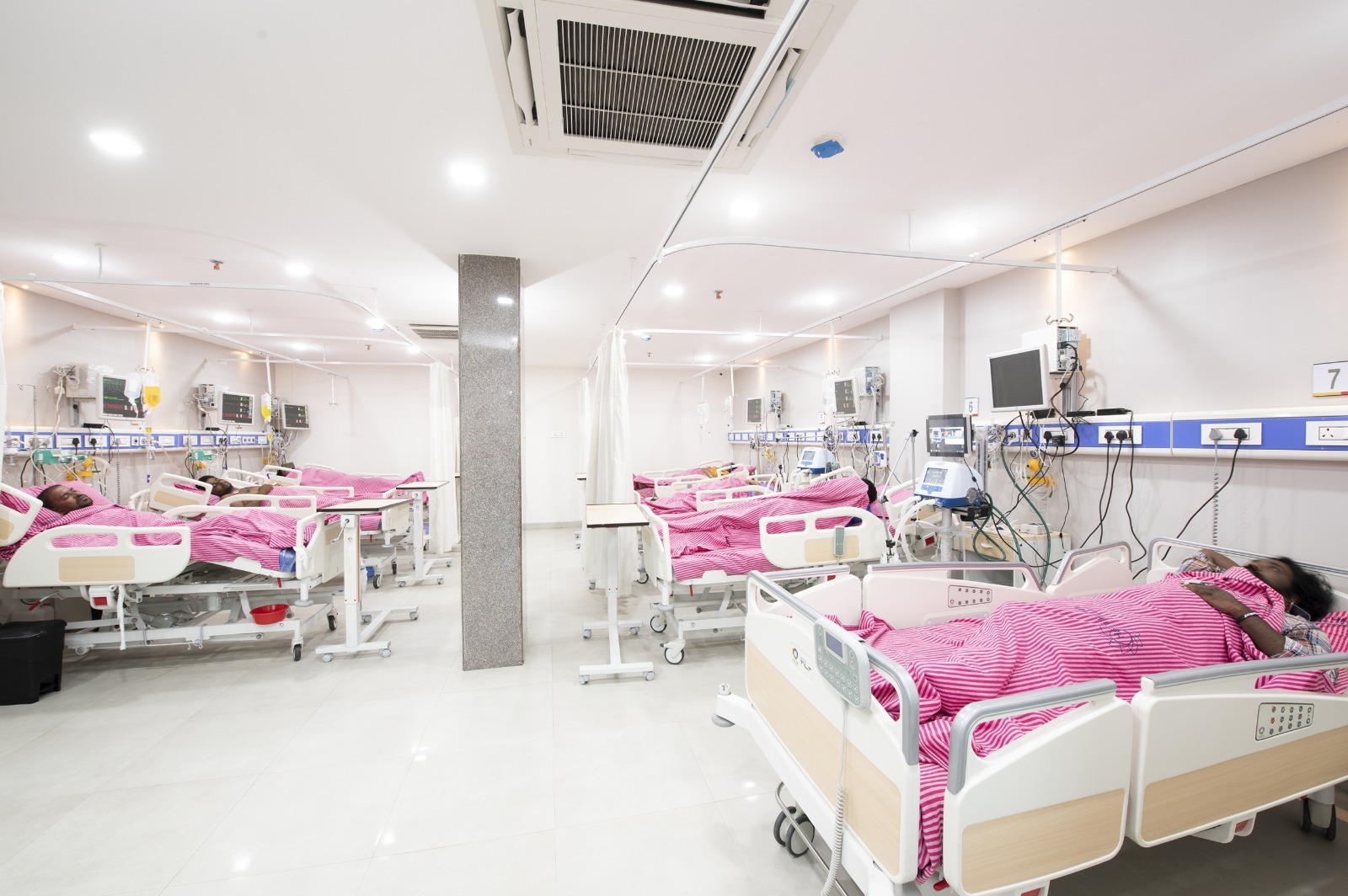Pulmonology
Started during difficult times of COVID-19 and was recognized as best center in AP for treatment of pulmonology disorders. It continues to serve people since
that difficult times
Best hospital for pulmonology in Vijayawada and Andhra Pradesh. Healthy environment accompanied by high end medical care is what you can find here. Harini hospitals have the best pulmonologists in Vijayawada and Andhra Pradesh. Whatever may be the issue related to your lungs like asthma, breathing problems, TB, Bronchoscopy, ILD, IPF etc., Harini Hospitals is the best hospital for lung problems in Vijayawada and Andhra Pradesh. Doctors here handle the patients with care and affection, they empathize with the. You can also find best doctor here for respiratory problems. A one stop destination that will have a effective treatment.
Respiratory disease causes a lot of health burden. It is estimated that worldwide 235 million people suffer from asthma, more than 200 million people have the chronic obstructive pulmonary disease (COPD), 65 million endure moderate-to-severe COPD, 1–6% of the adult population (more than 100 million people) experience sleep-disordered breathing, 9.6 million people develop tuberculosis (TB) annually, millions live with pulmonary hypertension and more than 50 million people struggle with occupational lung diseases, totalling more than 1 billion people suffering from chronic respiratory conditions. At least 2 billion people are exposed to the toxic effects of biomass fuel consumption, 1 billion are exposed to outdoor air pollution and 1 billion are exposed to tobacco smoke.
The common symptoms of respiratory symptoms are cough, shortness of breath, chest pain, fever and haemoptysis (blood in the sputum). The cough may present for a long time along with expectoration and sometimes haemoptysis. The presence of blood in the sputum needs proper investigation. If any patient is having these symptoms then they should visit a pulmonologist.
Common respiratory diseases are asthma, pneumonia, tuberculosis, COPD, lung cancer, interstitial lung diseases (ILD), pulmonary vascular diseases, allergic diseases, pleural effusion, pneumothorax, bronchiectasis, and sleep disorders.
Asthma patients usually present with cough with expectoration, and shortness of breath and they may have a seasonal variation. Asthma can be controlled by two methods- first by avoiding the trigger and second by taking proper medications. Common triggers of asthma are allergen exposure, stress, illness, climatic changes, exercise, and irritants in the air.
COPD is a disease that often results in obstruction of the airflow in and out of the lungs. Patients present with cough with expectoration which is gradually progressive unless properly treated. A common risk factor is smoking and others include air pollution, long-term exposure to harmful gases or other particulate matter.
Tuberculosis is a very common disease and patients usually present with cough, expectoration, haemoptysis, weight loss, fatigue and other symptoms.
Pneumonia results because of an infection that inflames the air sacs in one or both the lungs, later may be filled with fluid leading to respiratory failure. Causes for pneumonia include bacterial, viral, fungal, parasitic infections. People with diabetes, old age, immunocompromised states, cardiac and renal diseases are at high risk for developing pneumonia.
Lung cancer is currently the second most common cancer in both men and women. Cigarette smoking is the predominant cause of lung cancer. Other important risk factors are radon exposure, air pollution, and asbestos exposure, etc. Lung cancer patients are usually present with cough, haemoptysis, weight loss, accumulation of fluid in the pleural cavity, etc. The prognosis is usually grave if the patients are in the late stage of their disease.
ILD is a group of lung diseases that affect the interstitium (tissues and space around the air sacs of the lungs) of the lungs leading to scarring (fibrosis). The scarring causes stiffness in the lungs which makes it difficult to breathe and get oxygen to the blood stream. The Lung damage is often irreversible and gets worse as it progresses.
Sleep apnea is a condition where airways narrow or close during sleep, stopping airflow and causing apneas—short periods when you’re not breathing. Apneas often happen repeatedly throughout the night, interrupting your sleep and leaving you tired after you wake up. People with obstructive sleep apnea don’t know that they have the disorder because it occurs during sleep and gets unnoticed. Common signs of sleep apnea include snoring and choking or gasping while asleep, day time excessive sleeping, feel irritable, forgetful, unable to concentrate.
Sleep apnea may lead to high blood pressure, stroke, coronary artery disease, congestive heart failure, cardiac rhythm disturbances and difficulty controlling blood sugar levels, may even lead to sudden death.
Pleural diseases– common diseases are pleural effusion and pneumothorax. It occurs when air or water (sometimes pus) leaks into the space between the pleural layers. This leads to lung collapse and it prevents the lung from expanding when inhaling causing shortness of breath, cough, fever in case of infections.
Many of these patients need investigations like chest X-ray, CT scan, bronchoscopy, pleural biopsies, polysomnography (for patients with sleep disorders) and many other tests.
When a patient is suffering from COPD with frequent exacerbation, severe asthma, ILD, radiologically suspicious of tuberculosis but sputum is negative for tuberculosis, non-resolving pneumonia then these cases should be referred to a pulmonologist.
Preventive measures: The most important cause of lung diseases all over the world is cigarette smoking. So smoking cessation is very important. Air pollution is also a significant problem in today’s world, so the use of a face mask is also strongly recommended. An asthma attack may be triggered by eating some specific foods or on exposure to cold, avoidance of these situations is suggested for those patients.
Wearing a mask can avoid lot of respiratory diseases.
To conclude, respiratory diseases cause serious problems in society and effort from both doctors and society is needed to reduce the challenges posed by these diseases.




